Lovin’ Spoonful bassist talks to FBPO about the band’s storied history, as chronicled in his new memoir, “Hotter Than A Match Head”
Steve Boone is best known as the original bassist for the popular folk/rock group the Lovin’ Spoonful. The band attained major success with a string of AM radio hits, including “Do You Believe in Magic?,” “You Didn’t Have To Be So Nice,” “Daydream” and “Summer in the City” before ultimately being inducted into the Rock & Roll Hall of Fame in 2000. Steve’s new memoir, Hotter Than A Match Head: My Life on the Run with the Lovin’ Spoonful, was released this month by ECW Press.
FBPO: Let’s start from the beginning. What kind of musical upbringing did you have?
SB: For the first sixteen years of my life, I was surrounded by music. I actually took piano lessons at about ages 7, 8 and 9, but I never really gave much thought to being a musician and that’s because I was born on a Marine Corp base in North Carolina during the war. My dad was in the Marine Corp and my first memories are nothing but seeing Marines tossing me around in the crib. I was destined to be in the Marine Corp and I looked forward to it. I wanted to be a pilot and just got my life completely wrapped around that.
Then, at 16 years of age, on the last day of my junior year in high school, I was riding home with a buddy and we crashed into a tree at about a hundred miles an hour. My hopes for being in any kind of the service were over because my injuries were so severe, especially in my foot, which never fully recovered from the paralysis caused by the accident. So, in recovery, at age 16, when a guy doesn’t think about anything, having to sit on a couch twenty-four hours a day, my mom bought me a Gibson acoustic guitar.
Fortunately, my serious injuries were all from my waist down, so I could hold the guitar and play it. My older brother, Skip, who had already been performing in a rock band for about two or three years, would come by the house and show me a chord or another technique for making the chords. Over the course of about three months of doing that, I learned how to play the guitar and I listened to late night radio for the newest things coming out on AM radio. In those days, AM radio was where you heard all your music. I got good enough to play strum-along guitar at beach parties. Then when the folk music craze hit in the late ‘50s, I really felt a natural affinity for those kinds of songs.
I was starting to accumulate some knowledge as a musician, but it was still more or less a pastime while I recovered from my accident. Then, at about age 18, I had just graduated from high school and my brother came by the house and said, “You know, we need a rhythm guitar player in the band that we’re playing in right now. Would you be interested in trying out for the job?” I didn’t have an electric guitar, I had an acoustic guitar. I was playing pretty good by this time, but I didn’t really think I was good enough to play in a band. But heck, if somebody’s going to make me the offer and all I had to do was get an electric guitar, why not?! I went out to the music store in town and I found a fantastic gold top Gibson Les Paul and it was for sale. I got that guitar and got in the band with my brother Skip and future Spoonful drummer Joe Butler. I played guitar in that band for maybe two months when all of the sudden, out of the blue, the bass player, who was in the Air Force, announced he was retiring from the Air Force and going back to his home in Louisiana. He said to me, “Steve, why don’t you let me show you how to play bass? I like your musical taste. I’ve got a month’s time and I think you’ve got a good aptitude for it.” And you know something, Jon, boy was he right! As soon as I had the bass in my hands and the few basic lines that he showed me, it became my natural instrument. I loved playing it!
FBPO: How did the switch from guitar to bass affect your concept as a rhythm section player, particularly playing with a drummer?
SB: I had originally tried a drum kit when I was about 15 years old. One of my brother’s friends who was a drummer stayed with us for a couple months while he found an apartment. I would go down and try to get used to the drum kit, but I could never get the forearm and leg coordinated well enough to do the drumming. Once I had the bass, I heard the bass drum really well and it was just the perfect launching pad for a career as a bass player in this type of a band that was coming up.
I developed a style of playing that was hugely influenced by my affinity for the folk music I was hearing by Bob Dylan, the Kingston Trio and Joan Baez. Those kinds of groups influenced me musically, so when it came time to start applying that learning to the rock band that the Spoonful was going to become, I had my own style. I was so into the bass guitar that I really wasn’t like many people in bands [where] the bass player is really a guitar player who isn’t quite good enough to play leads on it. In my book, I say he’s the guy that gets picked to play right field in Little League because nobody hits it out there anyway!
FBPO: You mentioned Dylan and Joan Baez and the Kingston Trio, but what about bass players? Did you have any bass influences?
SB: You know something? Back in those days, there wasn’t a lot of attention paid to bass players. I knew the guys who got their names in the paper, the renowned as jazz players, but I wasn’t trying to be one of those guys. Harvey Brooks, I guess, was probably as close to a model for me. He was a studio bass player and I’d hear his playing on a lot of the folk records. More of my influences for the bass sound came from some groups that I really liked, like the Crusaders. I loved that band. I also loved Jimmy Smith, the organ player. I loved his music! He played a lot of the bass on the bass pedals. That was more or less the people that influenced me. I really didn’t have rock bass players in mind. They were sort of abstract. You didn’t hear about them like you’d hear about the guitar players or the keyboard players on the Elvis records and the Ricky Nelson records. To tell you the truth, I paid more attention to what they played than to what their names were. I didn’t really have a baseball card collection of bass players.
In my experience, bass players were kind of considered the back, behind-the-scenes guys that didn’t get much front man attention, except in jazz. In jazz, bass players were front and center and jazz solos were front and center. They got more ink, I guess you might say, than the rock & roll bass players. When it comes to bands that I liked, Paul McCartney certainly is a versatile and creative kind of bass player, where he took chances and didn’t just play the straight lines. And the bass players that Brian Wilson would use on his dates with the Beach Boys, I loved that kind of bass playing.
FBPO: That was Carol Kaye!
SB: When you asked me who were my influences, I can say the groups that I liked on the records and usually see who the studio bass player was. Then, as time would go on, I’d hear people like Stanley Clarke. And you can’t help but say Jaco Pastorius had monster chops. Now whether you liked his style or not was a matter of taste.
FBPO: Did you ever play upright at all?
SB: I did, but you know something, it was an odd transition for me. On a couple of cuts on the Daydream album and on the Hums of the Lovin’ Spoonful album, I played it, but because I never learned how to fret an acoustic bass correctly, it was more a question of just playing by ear. If it was a sound we were going after specifically, it only happened once or twice, so I would just play the electric bass because that’s what I learned on. It was difficult for me to do a good rockin’ session with an acoustic bass.
FBPO: How did the band get formed, the Lovin’ Spoonful?
SB: Well, two guys were very interested in becoming a rock band. They were both in the folk music scene. John Sebastian lived in Greenwich Village. He grew up there and had met a lot of the talent that would come through the village, including Lightnin’ Hopkins and Mississippi John Hurt. They were Delta blues-style players. John’s father was a world-famous classical harmonica player. John was equally good as a harmonica player, but more blues style. He got his guitar influences from Lightnin’ Hopkins and Mississippi John Hurt.
Zal Yanovsky was a Canadian who, living in the Toronto folk scene, hooked up with, among others, Denny Doherty, who went on to join the Mamas & Papas, and formed a group called the Halifax III. They played around the Toronto area, eventually making their way to New York City and Washington, D.C., where John Sebastian met the two of them. They met at a nightclub called the Shadows, where our future manager, Bob Cavallo, was the manager and owner. They came back to Greenwich Village in December of 1964, looking for a bass player and a drummer to round out the band they wanted to start.
Joe Butler and I played in a band on Long Island together for about three years with my brother Skip. It was a Top 40 band, but you didn’t call them “Top 40” bands then. They were cover bands. It was just a rock band. We played a whole variety of stuff, all the way from Jimmy Smith stuff to standards that you might hear from the ‘30s and ‘40s to the current hits of the day. We had played three years together and, when I went into New York on about December 20th, I had just returned from a motorcycle trip all around Europe with my best friend. We were trying to track down the British sound while we were in England and then we hit the continent and went to every country we could get to, just trying to absorb the influence of the scene over there. I shipped my motorcycle back and it was arriving at a dock in New York City around December 19th. I went to New York to pick it up, but my brother Skip and Joe Butler had, by that time, started a band and moved it into Greenwich Village. They were the first electric rock band to play in the Greenwich Village folk scene. Skip said to me, “When you come into town to get your motorcycle, why don’t you come and spend a couple nights with me because there are a couple of guys I just met who are looking for a bass player?”
And at this point in my life, I had made a plan that when I came back from Europe, I was going to return to college for the spring semester and get my degree in engineering and continue playing sideline music for income and for fun. I didn’t really think about it as a career option because I didn’t know how you went about putting a band together to try to get a record deal. The band I was in with Joe had cut some demos in New York just about a year before that, so we had some experience in the recording studio. What we really ha, though, was tremendous experience playing together four and five sets a night, three and four days a week for three years. Joe and I were really tight as a drummer and bass player.
When I got to New York that day, I went over to meet these two guys, John and “Zally.” They had their guitars and we jammed for a while in this Greenwich Village coffeehouse. It was closed in the afternoon, so we had the place to ourselves. We just got out the guitars – no drums, just two guitars and a bass – and played some songs that we knew and we clicked so well. It was such a good experience that they said, “Well, you know, we really like your playing. Do you know any drummers?”
They had already heard Joe Butler because of the band he played in with my brother. They had tried to get Joe to join them before I met them, but Joe’s band already had a record deal, so Joe turned them down at first. I said I know a drummer that used to play with the Kingsmen, who would sit in whenever Joe was singing up as the front man . He went by the name of Jan Carl. Jan was the manager of a place called the Bull’s Head Inn on Long Island that was closed for the winter, so he said we could come out to his hotel and rehearse there. He would play drums on our initial rehearsal, just so we could get tight together. And we did that for about two weeks, learned about maybe fifteen or twenty songs, good enough to go into New York, and played at a nightclub called the Night Owl Café. That gig didn’t go well, though. I think one of the things that Zally and John had not learned how to do was manage their volume very well, so they were kind of too loud for the owner of the nightclub. We were told to go back and practice a little bit more and turn it down some and when we got that happening, we could come back and maybe get a job.
So that led to us having a discussion about the drummer. Jan was a good drummer, but he was six years older than us and he really didn’t fit in, personality-wise, so we kicked it around for a while. We needed to have a drummer we all liked and Jan’s style of drumming really wasn’t fitting in with our music, the way we played, so we kind of had to fret over it for a little bit. After we had played the Night Owl the first time, though, there was kind of a buzz on the street about this new band that sounded real good. Joe Butler had heard this buzz and people talking about it and he showed up one day and said, “Hey, lookit, if the offer’s still open, I’m real interested in maybe joining the group,” because the record deal he had wasn’t working out. We had a rehearsal at the Hotel Albert and Joe was invited to come and sit in and play. The rehearsal went tremendously well! Joe impressed John and Zally very much. I knew how well he could play, so I wasn’t surprised by how well it clicked. From that point on, the basic four of the band was set. We went back to the Hotel Albert and rehearsed for about another two or three weeks with Joe and got the band to a much more listenable situation. We went back to the Night Owl in March of ’65 and that’s when the crowd started to show up and the record companies started to get interested. So things really began happening in late March and early April of 1965.
FBPO: How about the name of the band, “The Lovin’ Spoonful”? Would you like to clear up any misconceptions about what that means – or does not mean?
SB: Well, yeah. We’ve had a million people think that they knew what it meant and most of the people that speculated were wrong. They thought it was about a spoonful of drugs. Where it really came from was Mississippi John Hurt, who I mentioned earlier. He had been a big influence on John and when it came time for a name, Mississippi John had had a song in his repertoire called, “Coffee Blues” and in that song there’s a line that goes, “I wanna see my baby ‘bout a lovin’ spoonful.” What it means, in a sort of behind-the-scenes way, is that it has to do with sex. We couldn’t convince the people that wanted to assume it was about the spoonful of drugs junkies cooked their heroin up in.
When John came to the band with the idea, it had been suggested to him by a bass player named Fritz Richmond. Actually he played a washtub bass with the Jim Kweskin Jug Band. Fritz was a large influence on the Lovin’ Spoonful because we all loved the Jim Kweskin Jug Band. Fritz was a really unique character. He was like me, tall and skinny, and he played that washtub bass. I don’t know how you can make good notes come out of a broomstick handle, a washtub and a piece of twine, but he would make it sound like an acoustic bass! He suggested to John, “Why don’t you name the band that line from the John Hurt song, ‘I wanna see my baby ‘bout a lovin’ spoonful’?
When I first heard it, I didn’t think it was a good name. I thought it was just too odd-sounding for a rock band, but I was wrong. After the name came out and it worked, the fans liked it. It’s never been a liability except that people assumed that it was about the drug culture, but it just wasn’t. Not that we were down on the drug culture, it’s just not what the band was named about. It’s one of those stories you either just put up with or you try to stamp out, but it’s a hard story to get rid of.
FBPO: Did the success of the group surprise you at all?
SB: Well, it surprised me in how quick it happened. When I first joined up with John and Zally, I told them, I said, “Look, I’ve already paid my registration fee. I’m set to go back to college in two weeks. I’ll take another semester off, but if we don’t have at least some tangible evidence of a real record deal happening within six months, I’m letting you know now that I’m probably going to go back to school in the fall.
Times got real tight during that six months. Nobody had any money. We were surviving on handouts from friends and family and it was tough going. By about month number five, there still wasn’t a deal. We had “Do You Believe in Magic?” recorded and I was convinced it was a hit record, but nobody would sign the band and for one reason only: It was because we didn’t have a British accent, if you can believe that. I’m not making this up. Two of the biggest record companies in the country – in the world! – Columbia and Warner Bros., both said they loved the song and our other material, but they said they couldn’t sign the band because we didn’t have a British accent and they couldn’t promote an American band in 1965.
So it took for us to find a very small label that specialized in getting “45” singles on the radio. They didn’t know how to market albums, but they knew how to get “45” singles on the radio. When I heard that and that they were interested in signing the band, I thought maybe there’s a shot of success. I believed, like they did, that at the time, 1965, having a hit single on AM radio was the key to getting your name out there and having early and quick success. It was true because once “Do You Believe in Magic?” came out and they managed to muscle it onto the radio, the second hit came real quick right after and it went also Top 10. I had been skeptical that we would go so quickly.
FBPO: What was that second hit?
SB: “You Didn’t Have To Be So Nice,” one of the ones that I co-wrote with John Sebastian. Once we had “You Didn’t Have To Be So Nice” recorded and “Do You Believe in Magic?” was climbing the charts, I knew then we had a career because all we needed to do was get two hits in a row. The band was starting to sound better, too. In every single live performance we did, we got better and better and better. With John playing the autoharp on the first two songs in live performance, that was so unique. It created, “Well, this band’s different than the regular bands we’re seeing.” So we had two things going for us: We had hit records and we were sounding pretty good live. We had this unique combination of instruments, so I wasn’t too surprised at that point that our success came quickly. I expected it, to tell you the truth, and by the time a year had gone by, in June of 1966, we had our first four songs go right into the Top 10. Then with “Summer in the City” coming out at the end of June or early July, I knew we had a number one hit song coming up, so it was a pretty spectacular ride by that point. Of course things happened that changed all that, but up till that point, the rise was spectacular.
FBPO: Is it true the band was being considered for the show that became The Monkees?
SB: Yes. After “Magic” was a hit, we got a call from our manager to meet him at his office. He said, “These two producers want to pitch a deal to us,” and we didn’t know what it was. We had no idea, so we went with the manager, met with these guys in an office in Manhattan and they said, “Look, we got this idea for a TV show for a band that’s going to be sort of like the Beatles. It’s going to be a regular weekly show and you’ll have your own music and your personalities are going to be just as important as your music. It’ll be a weekly show. We’re shooting for a four-year run, forty weeks of entertainment.”
It all sounded good on paper, but then the details came out. They said, “We want you to change your name to the Monkees.” That was the deal breaker for us because we’d already had a hit record as the Lovin’ Spoonful. “You Didn’t Have To Be So Nice” was just about to come out and we knew it was going to be Top 10 too. It was that good of a song. We didn’t have any doubt that we were going to have our second hit. They wanted us to change our name to star in a TV show that may or may not have been a hit. It sounded like a good idea, but a lot of good ideas start out as a possibility and then turn into nothing. If we had changed our name and it didn’t work out, we’d be back to square one again.
So, we turned them down based on the fact that we already had a hit record as the Lovin’ Spoonful and we were just about to have a second one. We told them, “Thank you very much for considering us and I hope your plan works,” which it did. It was very successful, as you know, “but no thank you on changing our name. We like our name and we already have fans that know us by that name.” If they would have let us keep the name, we might have done it. I can’t say we would have, but we might have.
FBPO: What inspired you to write a book, Steve?
SB: Over the years, there were three things that happened that the public didn’t know the whole story about. One was a drug bust in May of 1966. A year later, Zally left the band under very weird circumstances and no explanation was given to the public. And number three was the way we had to rush through recording our albums. The last album we did never got the chance to get heard in the right context. It was the first album ever done on a 16-track recorder by a rock band. Our producer quit and our recording engineer quit. It was left to Jerry Yester, who had just joined the band, to eventually take on the roles of producer and engineer and finish the album. When I read that a group like the Eagles or Fleetwood Mac spent months recording single tracks for their albums, I’m reminded of the time we had to finish the Daydream album in three days. Completely, from basic tracks to finished, in three days, the whole entire album because we didn’t have the time. Management was working us to death.
There were a lot of things about the Lovin’ Spoonful, from 1968 on, that people don’t know. People heard our records on the radio, even after the band stopped performing. “Summer in the City,” as you well know, went on to become one of the summer classics. “Do You Believe in Magic?” and “You Didn’t Have To Be So Nice” were folk rock classics. “What a Day for a Daydream” had its own audience and was a huge classic hit. Over the years, I’d hear all these stories like, “Oh yeah, you know, the drug bust this,” and “Zally quit because of that,” and, “Jeez, why didn’t they ever make a good album? It was all singles.” I felt like all of that criticism may have had a little truth to it, but it wasn’t the whole story. It wasn’t the real, actual story of what happened in the drug bust. Why did Zally leave the band and why didn’t the Spoonful get a chance to make any more albums? And the Everything Playing album, with good material, just needed a better chance and more time spent on the mixing of it to make it be the gem I know it could have been.
So all of that was kind of bothering me over the years. I had my recording studio business in Baltimore in the ‘70s. Then I moved to Florida in the ‘80s and wanted to get the band touring again. We couldn’t get the band back together and go out and tour until the record company finally started paying us the royalties. There was no point in us touring and making money for the record company if they weren’t going to pay us. And they never paid us a penny, from June of 1967 until July of 1991. We didn’t receive a cent of royalties from the record company.
In 1991, we got the record company to agree to pay us some of the past royalties, not much, but some, and a better future royalty, so we reformed the band. We contacted John, asked him if he’d like to rejoin and he decided he didn’t want to. We asked Zally if he wanted to rejoin the band. He had a very successful restaurant in Canada that he didn’t have the time to take off from and be in a full-time band. So Joe and I were the two remaining members. We contacted Jerry Yester, who had been a member for one year, ’67 to ’68, and he agreed to do it. And then his brother Jim, who was one of the founding members of the group the Association, agreed to work with us for a year to get the band started up again.
So the band started touring again in 1992 and that’s when I put it in my head I’ve got to write a story that explains all of this. It took from then until 2007, almost fifteen years later, when Tony Moss wanted to do a story on my recording studio in Baltimore. By 2009, when the story came out in Baltimore magazine, it was such a well-done article that I asked him if he would consider working with me to do this book on the history of my life. I’ve done a lot more things than just be in the Lovin’ Spoonful.
Tony agreed in the fall of 2009 and then we got started in earnest a year later when he moved to Florida too with his job. It took us three years to do it, from 2010 to 2013. We got a deal with UCW Press to publish it and now, as of August 1st, it’s released. Everybody that’s read it so far that I’ve known has really enjoyed it and has said they found out some things about the band they didn’t know and it kind of straightened out some things they thought they did know. It was a hard job, harder than I thought it would be, but good things don’t come easy, so you’ve got to work at it.
I wish that John was in the band, but he’s not. Zally passed away in 2002 so he obviously can’t be in it. But the band is sounding great now. The Lovin’ Spoonful is looking at its fiftieth anniversary next year and we don’t know what we’re going to do. Something special for it, I hope. I’m feeling real good about how the book came out, so I hope I can convince people to read it. It’s an education on how a band can be easily led astray if they’re not careful and if they don’t pay attention. I mean everybody has that story, but in this case, there was so much misunderstanding and downright misinformation that the book clears up all that stuff.
FBPO: You mentioned that you’ve done a lot of stuff other than the Lovin’ Spoonful. Is any of that in the book too?
SB: Everything’s in the book! I didn’t hold anything back at all. I got into some legal trouble myself. I was sailing boatloads of marijuana back from Colombia in the late ‘70s and eventually that went bad, as most of those ventures will. But it was an adventure. I was living the life of a modern pirate. I loved being on the ocean. I’ve been a sailor my entire life and the adventure of doing that was something you can’t possibly recreate, except maybe in your mind. I’m really glad I did it. Am I glad I broke the law? No, of course not. I mean nobody should be glad they broke the law, but I also feel strongly about marijuana use. I think that history is not going to be kind to this generation of people that have made these laws where normally good people are thrown in with hardened criminals in long-term jail sentences for nothing more than smoking a mildly intoxicating weed. It makes no sense.
FBPO: What’s keeping you busy these days?
SB: One of the things I really want to do, and this might be impossible given the state of the record business, but the Lovin’ Spoonful does concerts. We have audiences that range in age from about early 50s on up to as old as they can get out there and still have a good time at the shows. They’re so enthusiastic about that music from the ‘60s and they so want to have those little trips down memory lane. I think there is a place for a boutique label that focuses not strictly on the baby boomers, but music that’s not quite as hard-edged as some of the rock music today, maybe with a little more acoustic flavor to it.
I’ve got four artists I’m working with. One of them’s the Lovin’ Spoonful. The three other artists are what I call crossover, from country to folk to bluegrass, and I’d like to approach one or two of the big labels, probably in Nashville, with the idea of starting this boutique label. We would try to gear our product towards the folks that are now what they call “empty nesters” that like going on memory trips and hearing music that they liked, that they remember from the ‘60s, when they were 20-year-olds and having their jollies before they got married and raised a family. I think with the current state of the record business, it’s going to be a hard hill to climb, but I see so much enthusiasm at our shows with the fans and in the autograph line afterwards and all their comments, like, “When are we going to have new music from the Spoonful?” and “How come we can’t hear this kind of music more often?” People are itching for it. It’s not a big audience. It’s not like you’re at the top of the charts on Billboard. That belongs to another generation. That’s not something that I feel comfortable with, but with music that I am comfortable with, I think there’s a market for it. I’ve just got to find a record company that’s willing to gamble with us a little bit and put some money behind trying to market out to these folks.
FBPO: What kind of equipment are you using?
SB: I have one of the most beautiful basses on earth and it’s not even an expensive one. It’s an Ibanez. It’s called a BTB. It was a one-year model. I bought it thirteen years ago and they now call it a different name. It’s got active and passive circuitry in it. It’s terrific! I bought it because it was light. From my auto wreck so many years ago, I’ve got a terrific neck injury, so the heavy Fender bass I was using became too heavy. I also played a Kubicki X Factor and I loved that bass! It was light too, and it had that extended E string and great electronics. The bass that I had that was my coveted one-and-only was my Fender Jazz bass, dual concentric, 1961, but it got stolen. My original bass with the Spoonful was a Guild Starfire II. I also have a beautiful D-28 Martin and a J-100 Gibson. My wife and I have a three-year-old Japanese Fender bass, plus I’ve got a Fender Statocaster and my grand piano. For a bass amp rig, I use an original Acoustic 370 top and a custom 2X12 cabinet. For effects I have my Digitech BP-80 pedal.
FBPO: I understand you’re related to Daniel Boone.
SB: Yes I am!
FBPO: How so?
SB: Well, the Boone family came over from Germany in the late 1600s and settled in the Bucks County area of Pennsylvania. I think they had a land grant in that area. As time went on, Daniel was born. I think he had five or six brothers and four sisters. Big family. Some of the family moved down to Delaware and some moved down to North Carolina and Kentucky. Daniel’s brother, Squire Boone, that lived in Delaware is from the vine of Boones that I’m directly related to. They were a family of farmers and merchants in Philadelphia.
FBPO: What would you be if you were not a bass player?
SB: I have such a passion for sailing that I think it’s hard to say I wouldn’t be in the sailing industry, in something to do with charter boats or selling sailboats. But really, the most likely career path would have been in automotive engineering and, more specifically, in racing development. To this day, my major passion and avocation outside of music is automobile racing and car development. Once aviation was off the table because of my injury and it became clear I was never going to be able to fly jet planes in the military, the only other thing besides music that I cared a whole lot about was automotive engineering and automobile racing. And motorcycle racing. But they’re all the same. A motor and wheels, you know!
FBPO: Any final thoughts?
SB: I’d like to have it be said that despite what I might have complained about in the book, I don’t feel rained on at all. I feel like one of the most fortunate people in the world. I’ve had such a generous life and fate has treated me very kindly, despite my ups and downs. I don’t want the reader of the book to come away thinking that this is a tale of woe. It’s actually a tale of joy. Any tale has its moments of not exactly what you wanted or wished for. That certainly happened to me too, I’m no different than anyone else. But at the end of the day, I’d like it said that I’m a very happy camper.
Steve’s memoir, Hotter Than A Match Head: My Life
on the Run with the Lovin’ Spoonful, is available here:
Related post:
[table id=106 /]
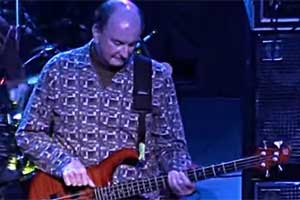


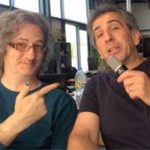

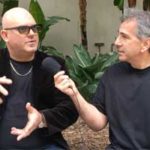
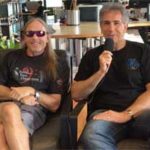
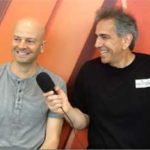
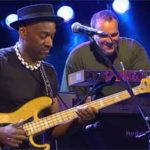

Thanks Jon for a great interview.I enjoyed it so much.
I am a big Spoonful fan.I really like their music.I enjoyed learning things about the band in your interview.
Kudos to you and good work!
Steve has become a friend over the past 3 or 4 years, and I really love watching him and the Lovin’ Spoonful still bringing the house down on their shows. A great interview of a great guy!